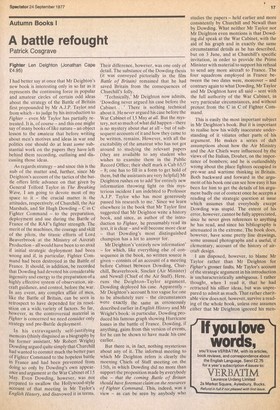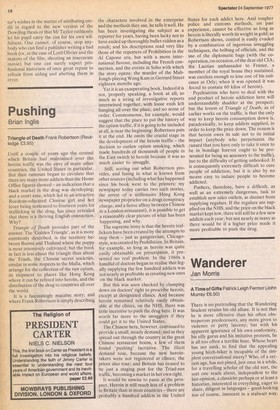Autumn Books I
A battle refought
Patrick Cosg rave
Fighter Len Deighton (Jonathan Cape E4.95) I had better say at once that Mr Deighton's new book is interesting only in so far as it represents the continuing force in popular and amateur circles of certain odd ideas about the strategy of the Battle of Britain first propounded by Mr A.J.P. Taylor and from which to judge by his introduction to Fighter — even Mr Taylor has partially retreated. It is, of course — and this one might say of many books of like nature — an object lesson to the amateur that before writing about men's motives and ideas in war and politics one should do at least some substantial work on the papers they have left behind them recording, outlining and discussing those ideas.
As regards strategy — and since this is the nub of the matter and, further, since Mr Deighton's account of the tactics of the battle offers little advance on that given by General Telford Taylor in The Breaking Wave, I am going to devote most of my space to it — the crucial matter is the attitudes, respectively, of Churchill, the Air Marshals, and Sir Hugh Dowding — C in C Fighter Command — to the preparation, deployment and use during the Battle of France of the RAF's fighter strength. The merit of the machines, the courage and skill of the pilots, the titanic efforts of Lord Beaverbrook at the Ministry of Aircraft Production — all would have been to no avail if initial strategic deployment had been wrong and if, in particular, Fighter Command had been destroyed in the Battle of France. It should, in addition, be recorded that Dowding had devoted his considerable ingenuity and energy to the preparation of a highly effective system of observation, aircraft guidance, and control, before the war. In any event, any complex affair of men, like the Battle of Britain, can be seen in retrospect to have depended for its resolution on a wide. variety of factors. So far, however, as the controversial material in Fighter is concerned we need consider only strategy and pre-Battle deployment.
In his extravagantly self-justifying memoirs (thinly disguised as a biography by his former assistant, Mr Robert Wright) Dowding argued quite simply that Churchill had wanted to commit much the better part of Fighter Command to the hopeless battle in France and had been prevented from doing so only by Dowding's own appearance and argument at the War Cabinet of 15 May. Even Dowding, however, was not prepared to swallow the Hollywood-style account of that meeting in Mr Taylor's English History, and disavowed it in terms. Their difference, however, was one only of detail. The substance of the Dowding thesis (it was conveyed pictorially in the film Battle of Britain) remained that he had saved Britain from the consequences of Churchill's folly.
'Technically,' Mr Deighton now admits, 'Dowding never argued his case before the Cabinet.. ' There is nothing technical about it. He never argued his case before the War Cabinet of 1,5 May at all. But the mystery, not so much of what did happen — there is no mystery about that at all — but of subsequent accounts of it and how they came to be written, remains. However, with all the excitability of the amateur who has not got around to studying the relevant papers (they are available to any student who wishes to examine them in the Public Record Office; their shelf mark is Cab 65/7 — 8; one has to fill in a form to get hold of them, but the assistants are very helpful) Mr Deighton rushes on to add 'for entirely new information throwing light on this mysterious incident I am indebted to Professor A.J.P. Taylor who has most generously passed his research to me.' Since we learn elsewhere in the book that Mr Taylor first suggested that Mr Deighton write a history book, and since, as author of the introduction to Fighter, he presumably read its text, it is clear — and will become more clear — that Dowding's most distinguished champion has a lot to answer for. Mr Deighton's 'entirely new information' — for which, like everything else of consequence in the book, no written source is given — consists of an account of a meeting before Cabinet b'etween Dowding, Churchill, Beaverbrook, Sinclair (Air Minister) and Newall (Chief of the Air Staff). Here, runs the Deighton—Taylor argument, Dowding deployed his case. Apparently — Mr Deighton's account ts too vague for one to be absolutely sure — the circumstances were exactly the same as erroneously described earlier in English History and Mr Wright's book: in particular, Dowding produced his famous graph showing Hurricane losses in the battle of France. Dowding, if anything, gains from this version of events, for he can be shown to have made his case earlier.
But there is, in fact, nothing mysterious about any of it. The informal meeting to which Mr Deighton refers is clearly the morning Chiefs of Staff meeting on the 15th, in which Dowding did no more than support the proposition made by everybody else — that the coming Battle of Britain should have fbremost claim on the resources of Fighter command. This, indeed, was a view — as can be seen by anybody who studies the papers — held earlier and more consistently by Churchill and Newall than by Dowding. What neither Mr Taylor nor Mr Deighton even mentions is that Dowding did speak at the War Cabinet, with the aid of his graph and in exactly the same circumstantial details as he has described, but on 3 June, and at Churchill's specific invitation, in order to provide the Prime Minister with material to support his refusal to send any more aircraft to France. The four squadrons employed in France between the two dates were, moreover — and contrary again to what Dowding, Mr Taylor and Mr Deighton have all said — sent with the full authority of the War Cabinet, in very particular circumstances, and without protest from the C in C of Fighter Command.
This is easily the most important subject in Mr Deighton's book. But it is important to realise how his wildly inaccurate understanding of it vitiates other parts of his argument. He makes a series of daft assumptions about how the Air Ministry and the Air Chiefs were influenced by the views of the Italian, Douhet, on the importance of bombers; and he is outlandishly wrong about the place fighters occupied in pre-war and wartime thinking in Britain. Both backward and forward in the argument of his book one can see how easy it has been for him to get the details of his argument badly out of context once he accepts a reading of the strategic question at issue which assumes that everybody except Dowding was stupid. The extent of his error, however, cannot be fully appreciated, since he never gives references to anything he has read, and since his bibliography is attenuated in the extreme. The book does, 'however, have some pretty line drawings, some unusual photographs and a useful, if elementary, account of the history of aircraft design.
I am disposed, however, to blame Mr Taylor rather than Mr Deighton for Fighter's grosser faults. Mr Taylor's account of the strategic argument in his introduction is uncharacteristically ambiguous. I rather thought, when I read it, that he had retracted his sillier ideas, but was unprepared to admit as much. That rather charitable view does not, however, survive a reading of the whole book, unless one assumes either that Mr Deighton ignored his men tor's wishes in the matter of attributing credit in regard to the new version of the Dowding thesis or that Mr Taylor ruthlessly let his pupil carry the can for his own wilfulness. One cannot, of course, stop anybody who can find a publisher writing a bad book (or, in the case of Lord Olivier and the makers of the film, shooting an inaccurate movie) but one can surely expect professional historians of once great repute to refrain from aiding and abetting them in error.



































 Previous page
Previous page